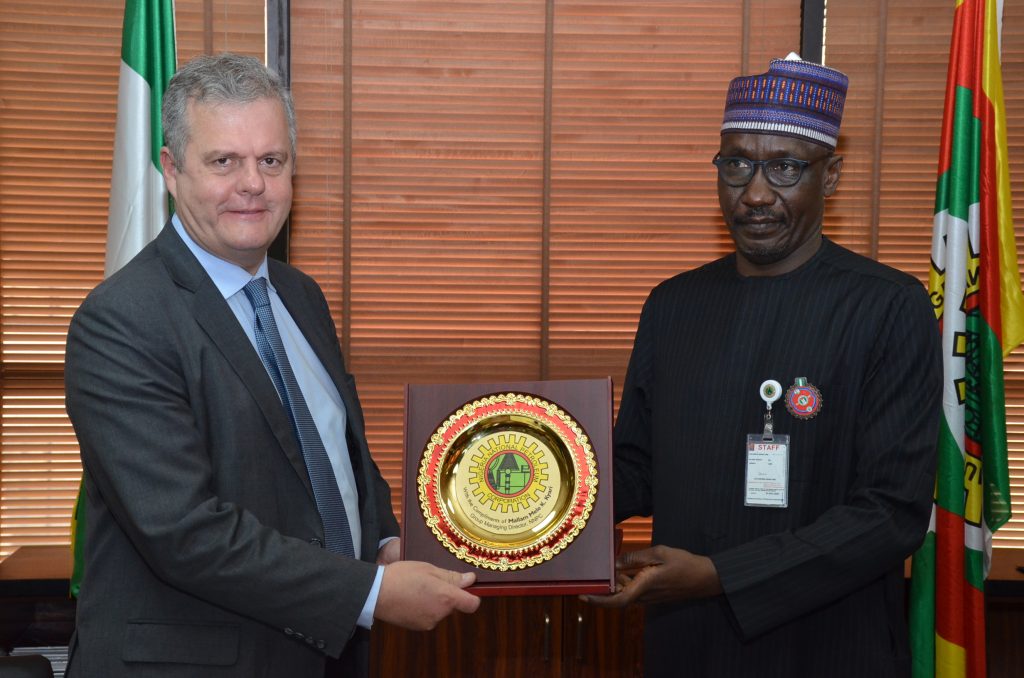NNPC gets EITI’s endorsement over monthly financial accounts
November 25, 20191.3K views0 comments

Nigerian National Petroleum Corporation (NNPC), the state-owned oil behemoth, has received an endorsement from global transparency body, the Extractive Industries Transparency Initiative (EITI), as being one of the global leaders in the area of financial accounts and data publication.
The endorsement and commendation was given by no less a person than the executive director, Mark Robinson, during a business visit to the Mele Kyari, group managing director of the NNPC in Abuja on Monday, according to a statement signed by Samson Makoji, acting group general manager, group public affairs division of the corporation.
In commending the NNPC Robinson urged other companies to emulate the excellent transparent corporate culture of the corporation. Robinson was in the company of Waziri Adio, executive secretary, Nigeria Extractive Industries Transparency Initiative (NEITI), as well as other top officials of the Initiative.
The statement referred to Robinson as saying he was hopeful that NNPC would build on the commendable accountability culture, and that he then called on the corporation to share its experience with other state owned and private oil companies.
Robinson invited the NNPC to join the EITI family as a supporting company, explaining that the corporation would be joining 60 companies that are already members of the global transparency body when it joins.
“NNPC is well placed as a transparent company to promote EITI’s new standards of beneficial ownership, commodity trading transparency and contract transparency, all of which the NNPC GMD is strongly committed to bringing to reality,” said Robinson.
Makoji quoted Robinson as describing Nigeria as one of the most important members of EITI since 2004, and that this membership has led to shared insights, partnerships and knowledge while also describing the leadership of Kyari as very capable and credible.
In his contribution, NEITI’s executive secretary of NEITI, Waziri Adio, applauded Kyari for his commitment to transparent commodity trading, contract transparency and mainstreaming, stressing that the initiative was happy about the signals it was receiving from the NNPC.
Responding Kyari, stated that the corporation was the only entity in the entire world that publishes its financial and operations report on a-month-by-month basis and invited other companies to emulate the NNPC’s example.
According to him, the setting up of the NEITI, NNPC Remediation Joint Committee was a welcome development, adding that the committee would help to further bolster the transparency trajectory of the corporation.
“Our commitment to accountability and transparency is not just to EITI and global companies but also to the real shareholders of the corporation. The over 200 million Nigerians are the owners of this company. Our priority is to be accountable to the Nigerian people who have the right to know what we are doing and doing it in the right way and to report correctly to them. I believe that the EITI processes are helping us to become more accountable to our shareholders,” said Kyari.
According to Kyari, the direct sale direct purchase (DSDP) programme of the corporation was a clear demonstration of its commitment to transparent contract processes, adding that all the companies who won the bid for the next 12 months have had their names published.
He noted that for the Beneficial-Ownership new standard of the EITI to be effective, there was need for the Initiative to engage the international banks, trading companies and all the other stakeholders of the business to display the owners of some of the companies.
The NNPC and Nigeria were poised to ensuring transparency and accountability in the oil and gas industry as pioneer members of EITI, Kyari stated, adding that President Muhammadu Buhari was steering the nation on this globally accepted norms.
EITI is described as a global standard for the good governance of oil, gas and mineral resources. It seeks to address the key governance issues in the extractive sectors.
